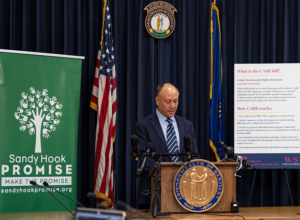Our guest blogger, Sara Militello, is the Associate Vice President of Implementation at Sandy Hook Promise. She supports students in learning the signs of suicide and violence and she is also an expert on teaching students how to get help with a suicidal crisis.
A few years ago, when I was a classroom teacher, I had the devastating experience of losing a student to suicide. She was a talented 16-year-old girl, an excellent artist, and a reader with a bright future ahead of her. Sadly, she also struggled with depression. At her funeral, all I could think was, I know she didn’t mean it.
When I look back, it’s difficult to realize that so many warning signs were missed by myself and the entire school community. That’s why it’s so important to learn the signs someone shows when they need help so that we can get better at stopping suicide.
Suicidal thoughts, depression, and mental health issues are as serious as any other medical emergency. You deserve support, treatment, and care, just like if you broke your leg or got a bad case of COVID. That’s why I’m answering these common questions from teens on how to help stop suicide.
If You’re Struggling with Suicide
1. What should I do about suicidal thoughts?
Talking about suicide can be difficult and bring up painful experiences. Please dial 988 to reach the Suicide & Crisis Lifeline or text the Crisis Text Line at 741-741 if you’re struggling with suicidal thoughts right now.
2. How can I talk to my parents about depression and suicide?
Tell your parents how you’re feeling, even though it might be uncomfortable. Be direct, and fill them in on what’s happening and how you feel. Share that you’re telling them so that they can get you the help you need. Help can mean finding a therapist in your community that you can talk to. Your parents could also set you up with an online therapy account, that way you can talk to a professional without having to leave your room.
3. Should I tell a teacher or school counselor about my suicidal thoughts?
Trusted adults in your school – like teachers and school counselors – are useful to talk to about suicidal thoughts. They can connect you with resources for anything school-related that’s coming up, like missing deadlines or test anxiety. Talking to an adult at your school means they can do things like extend deadlines and give you extra time or dedicated space for taking tests.
4. If I tell a teacher or school counselor I self-harm and am suicidal, will they report me?
Teachers or school counselors have to make a report if they know you’re in danger. They do this is to keep you safe. No matter what, your trusted adult’s goal is to get you help and keep you safe.
5. Will my teacher or school counselor get in trouble if they don’t report my self-harm or suicidal thoughts?
Adults who work in schools are “mandated reporters.” This means that they must report when a student could be harmed. That includes if a student is thinking of harming themself. They have a responsibility to report suicidal or self-harm thoughts. While it may feel uncomfortable, it could save your life.
If Your Friend is Suicidal
1. What do I do if my friend says they are suicidal?
Above all, the most important thing you need to do is to talk to a trusted adult or contact a crisis hotline. Even if your friend tells you not to tell anyone, you have to get help for your friend. If they were in a car accident, you wouldn’t think twice. Suicide is just as deadly as a fatal car crash. You don’t have to help your friend on your own. Your trusted adult will have the knowledge needed to get help for your friend.
2. How do I help if my friend is thinking about suicide?
The first thing you can do is just to listen. Your friend may have been carrying these feelings for a while and needs someone to talk to. After you’ve listened to what they have to say, go immediately to a trusted adult or use a hotline or crisis text line. Listening is what they need, talking to an adult is what keeps them safe.
3. What should you say to a suicidal friend, in person, on social media, or over text?
Let your friend know that you care and because you care, you want them to get help. You can say things like, “That’s rough. We’ll get through this together. I got you.” Urge them to talk to a trusted adult. Or, if they don’t have a trusted adult around, send them the Suicide & Crisis Lifeline (988) and the Crisis Text Line (741-741).
4. What are things you should not say to someone who’s suicidal?
Make sure you stay away from saying things that will make your friend feel like you didn’t listen to them, don’t care, or that they should, “just get over it.” You may feel scared, angry, or upset, and those are valid feelings. But now is not the time to express them to your friend. Also, avoid toxic positivity, such as giving advice that lessens what your friend is experiencing. Don’t say things like “sleep on it and you’ll feel better,” or, “you’ll feel better if you work out.”
5. What are ways we can help stop teen suicide?
You can prevent suicide by learning the warning signs and what to do when you see them. Acting immediately when you see warning signs can make a life-or-death difference. Make sure your whole school knows about the warning signs of suicide and what to do when they see them. Advocate for bringing suicide prevention programs like Say Something: Prevent Suicide to your school by talking to your teachers and counselors. Learn more.
Stop Teen Suicide By Learning the Warning Signs
Join us in raising awareness about universal youth suicide prevention for all students. It’s not just for those who are experiencing suicidal ideation. Universal prevention helps build a community that knows what warning signs are and what to do when they see them.


